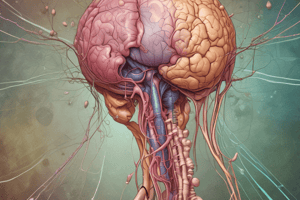Podcast
Questions and Answers
What is the definitive treatment for pheochromocytoma?
What is the definitive treatment for pheochromocytoma?
- Bilateral adrenalectomy
- Surgical removal of the tumor (correct)
- Adrenalectomy
- Medication management
What is the purpose of positioning the patient in a supine position before measuring plasma catecholamines?
What is the purpose of positioning the patient in a supine position before measuring plasma catecholamines?
- To increase oxygen supply
- To prevent dehydration
- To avoid stress-related elevation of catecholamine levels (correct)
- To enhance blood flow to the brain
Which hormone primarily increases blood pressure by constricting arterioles?
Which hormone primarily increases blood pressure by constricting arterioles?
- Aldosterone
- Cortisol
- Angiotensin II (correct)
- Epinephrine
Which of the following symptoms is NOT typically associated with pheochromocytoma?
Which of the following symptoms is NOT typically associated with pheochromocytoma?
What complication may arise from untreated pheochromocytoma?
What complication may arise from untreated pheochromocytoma?
What role does epinephrine play in glucose metabolism during pheochromocytoma?
What role does epinephrine play in glucose metabolism during pheochromocytoma?
What type of needle is recommended to avoid stress elevation of catecholamines during blood specimen collection?
What type of needle is recommended to avoid stress elevation of catecholamines during blood specimen collection?
Which hormones are produced by the adrenal cortex?
Which hormones are produced by the adrenal cortex?
What is the primary cause of hyperglycemia in pheochromocytoma?
What is the primary cause of hyperglycemia in pheochromocytoma?
What condition is diagnosed by measuring urinary catecholamine metabolites?
What condition is diagnosed by measuring urinary catecholamine metabolites?
What indicates the normal range for plasma catecholamine levels?
What indicates the normal range for plasma catecholamine levels?
Which symptom is NOT typically associated with pheochromocytoma?
Which symptom is NOT typically associated with pheochromocytoma?
What physiological process occurs in the liver as a response to increased catecholamines?
What physiological process occurs in the liver as a response to increased catecholamines?
What position is recommended for a patient during an episode of hypertension related to pheochromocytoma?
What position is recommended for a patient during an episode of hypertension related to pheochromocytoma?
Which of the following is a primary treatment approach during hypertensive episodes in pheochromocytoma?
Which of the following is a primary treatment approach during hypertensive episodes in pheochromocytoma?
What is a common diagnostic test for overactivity of the adrenal medulla?
What is a common diagnostic test for overactivity of the adrenal medulla?
Which symptom is NOT commonly associated with pheochromocytoma?
Which symptom is NOT commonly associated with pheochromocytoma?
What factor is likely to elevate catecholamine levels and may interfere with diagnostic results?
What factor is likely to elevate catecholamine levels and may interfere with diagnostic results?
What effect does pheochromocytoma have on blood flow to peripheral blood vessels?
What effect does pheochromocytoma have on blood flow to peripheral blood vessels?
Which of the following is NOT considered one of the '5 H's' associated with pheochromocytoma?
Which of the following is NOT considered one of the '5 H's' associated with pheochromocytoma?
What effect does pheochromocytoma have on the urinary bladder?
What effect does pheochromocytoma have on the urinary bladder?
Which sign may suggest an overactivity of the sympathetic nervous system in a patient with pheochromocytoma?
Which sign may suggest an overactivity of the sympathetic nervous system in a patient with pheochromocytoma?
How does pheochromocytoma typically affect gastrointestinal function?
How does pheochromocytoma typically affect gastrointestinal function?
Which behavioral trigger could potentially precipitate symptoms of pheochromocytoma?
Which behavioral trigger could potentially precipitate symptoms of pheochromocytoma?
Study Notes
Pheochromocytoma Overview
- Pheochromocytoma is typically a benign tumor originating from adrenal medulla cells.
- Common symptoms include headache, palpitations, diaphoresis, hypertension, and other cardiovascular disturbances.
- Additional symptoms may include tremors, flushing, anxiety, hyperglycemia, vertigo, blurring of vision, tinnitus, air hunger, and dyspnea.
Diagnosis
- Plasma and urine catecholamine levels are key diagnostic tests.
- Positioning the patient supine for 30 minutes prior to blood draw helps prevent stress-induced elevation of catecholamine levels.
- Urine catecholamine metabolites are directly measured; normal values are 0.2-0.9 mg% for blood and 0.2-7 mg/24 hours for urine.
Surgical Management
- Definitive treatment involves surgical removal of the tumor via adrenalectomy.
- Bilateral adrenalectomy may be necessary if tumors are present in both adrenal glands.
Adrenal Cortex Hormones
- The adrenal cortex produces three main steroid hormones:
- Glucocorticoids (Hydrocortisone): Secreted in response to angiotensin II, affecting blood pressure.
- Mineralocorticoids (Aldosterone): Regulate sodium and potassium levels.
- Sex Hormones (Androgens): Primarily male sex hormones.
Hyperglycemia Mechanism
- Hyperglycemia results from epinephrine-induced glycogenolysis and gluconeogenesis in the liver and decreased insulin secretion from pancreatic islets.
Hypertensive Crisis
- A hypertensive crisis may occur due to excess secretion of catecholamines, necessitating immediate medical intervention.
Medical Management
- During hypertensive episodes, patients are placed on bed rest with the head of the bed elevated to reduce orthostatic blood pressure spikes.
- It's essential to control factors that elevate catecholamine levels for valid test results:
- Avoid consumption of coffee, tea, and tobacco.
- Minimize emotional and physical stress and refrain from over-the-counter diuretics and stimulants.
Sympathetic Nervous System Impact
- Signs of sympathetic nervous system overactivity can lead to various symptoms such as:
- Decreased salivary secretion
- Dry mouth and increased thirst
- Decreased gastrointestinal secretion and motility
- Increased renin secretion, leading to vasoconstriction and elevated blood pressure.
Studying That Suits You
Use AI to generate personalized quizzes and flashcards to suit your learning preferences.
Related Documents
Description
Test your knowledge on the management of pheochromocytoma, focusing on symptoms such as headache, diaphoresis, and palpitations. This quiz will cover both diagnostic and surgical management methods, highlighting best practices for patient care.




